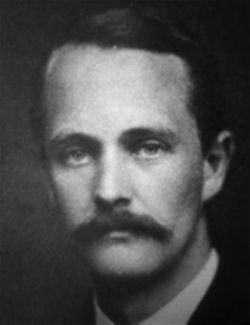The Text is from Motherwell's Minstrelsy (1827). It is based on a stall-copy, presumably similar to one preserved by Sir Walter Scott at Abbotsford, combined with a version from recitation, which Child none the less calls 'well remembered from print.'
The Story has no historical foundation, as far as can be discovered; and for once we have a traditional tale inculcating a moral, though we do not understand why the 'nourice' betrays Sir James to his enemies.
Michael Bruce wrote a version of the story of this ballad, which seems to have become more popular than the ballad itself. It may be seen in A. B. Grosart's edition of his works (1865), p. 197.
SIR JAMES THE ROSE
1.
O heard ye of Sir James the Rose,
The young heir of Buleighan?
For he has killed a gallant squire,
And his friends are out to take him.
2.
Now he's gone to the house of Marr,
Where the Nourice was his leman;
To seek his dear he did repair,
Thinking she would befriend him.
3.
'Where are you going, Sir James?' she says,
'Or where now are you riding?'
'Oh, I am bound to a foreign land,
For now I'm under hiding.
4.
'Where shall I go? where shall I run?
Where shall I go to hide me?
For I have killed a gallant squire,
And they're seeking to slay me.'
5.
'O go ye down to yon ale-house,
And I'll there pay your lawin';
And if I be a maiden true,
I'll meet you in the dawin'.'
6.
'I'll no go down to yon ale-house,
For you to pay my lawin';
There's forty shillings for one supper,
I'll stay in't till the dawin'.'
7.
He's turned him richt and round about,
And rowed him in his brechan;
And he has gone to take his sleep,
In the lowlands of Buleighan.
8.
He had not weel gone out o' sicht,
Nor was he past Millstrethen,
Till four-and-twenty belted knights,
Came riding owre the Lethan.
9.
'O have ye seen Sir James the Rose,
The young heir of Buleighan?
For he has killed a gallant squire,
And we're sent out to take him.'
10.
'O I have seen Sir James,' she says,
'For he passed here on Monday;
If the steed be swift that he rides on,
He's past the gates o' London.'
11.
As they rode on man after man,
Then she cried out behind them,
'If you do seek Sir James the Rose,
I'll tell you where you'll find him.'
12.
'Seek ye the bank abune the mill,
In the lowlands of Buleighan;
And there you'll find Sir James the Rose,
Lying sleeping in his brechan.
13.
'You must not wake him out of sleep,
Nor yet must you affright him,
Till you drive a dart quite through his heart,
And through his body pierce him.'
14.
They sought the bank abune the mill,
In the lowlands of Buleighan,
And there they found Sir James the Rose,
Lying sleeping in his brechan.
15.
Up then spake Sir John the Graeme
Who had the charge a-keeping,
'It shall ne'er be said, dear gentlemen,
We killed a man when a-sleeping.
16.
They seized his broad sword and his targe,
And closely him surrounded;
And when he waked out of his sleep,
His senses were confounded.
17.
'O pardon, pardon, gentlemen,
Have mercy now upon me.'
'Such as you gave, such you shall have,
And so we fall upon thee.'
18.
'Donald, my man, wait me upon,
And I'll gie you my brechan;
And if you stay here till I die,
You'll get my trews of tartan.
19.
'There is fifty pounds in my pocket,
Besides my trews and brechan,
Ye'll get my watch and diamond ring,
And take me to Loch-Largan.'
20.
Now they've ta'en out his bleeding heart,
And stuck it on a spear,
Then took it to the House of Marr,
And gave it to his dear.
21.
But when she saw his bleeding heart,
She was like one distracted,
She wrung her hands and tore her hair,
Crying, 'Oh! what have I acted.
22.
'It's for your sake, Sir James the Rose,
That my poor heart's a-breaking;
Cursed be the day I did thee betray,
Thou brave knight o' Buleighan.'
23.
Then up she rose, and forth she goes,
And in that fatal hour
She bodily was borne away,
And never was seen more.
24.
But where she went was never kent;
And so, to end the matter,
A traitor's end you may depend
Can never be no better.
Sir James The Rose
Frank Sidgwick
Suggested Poems
Explore a curated selection of verses that share themes, styles, and emotional resonance with the poem you've just read.
